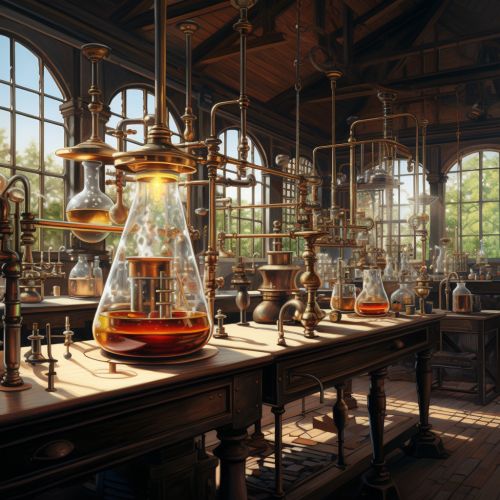Chemistry
Introduction
Chemistry is the scientific discipline involved with elements and compounds composed of atoms, molecules and ions: their composition, structure, properties, behavior and the changes they undergo during a reaction with other substances. It is often called the central science because it bridges natural sciences, including physics, geology and biology.
History of Chemistry
The history of chemistry represents a time span from ancient history to the present. By 1000 BC, civilizations used technologies that would eventually form the basis of the various branches of chemistry. Examples include extracting metals from ores, making pottery and glazes, fermenting beer and wine, extracting chemicals from plants for medicine and perfume, rendering fat into soap, making glass, and making alloys like bronze.
Branches of Chemistry
Chemistry is typically divided into several major sub-disciplines. There are also several main cross-disciplinary and more specialized fields of chemistry.
Physical Chemistry
Physical chemistry is the study of macroscopic, atomic, subatomic, and particulate phenomena in chemical systems in terms of the principles, practices, and concepts of physics such as motion, energy, force, time, thermodynamics, quantum chemistry, statistical mechanics, analytical dynamics and chemical equilibrium.
Organic Chemistry
Organic chemistry is the study of the structure, properties, composition, reactions, and synthesis of organic compounds that contain carbon atoms.
Inorganic Chemistry
Inorganic chemistry is the study of the properties and behaviors of inorganic compounds. This field covers all chemical compounds except the myriad organic compounds (carbon-based compounds, usually containing C-H bonds), which are the subjects of organic chemistry.
Analytical Chemistry
Analytical chemistry is the analysis of material samples to gain an understanding of their chemical composition and structure. Analytical chemistry incorporates standardized experimental methods in chemistry. These methods may be used in all sub-disciplines of chemistry, excluding purely theoretical chemistry.
Biochemistry
Biochemistry is the study of the chemicals, chemical reactions and chemical interactions that take place in living organisms. Biochemistry and organic chemistry are closely related, as in medicinal chemistry or neurochemistry. Biochemistry is also associated with molecular biology and genetics.
Chemical Reactions
A chemical reaction is a process that leads to the chemical transformation of one set of chemical substances to another. Classically, chemical reactions encompass changes that only involve the positions of electrons in the forming and breaking of chemical bonds between atoms, with no change to the nuclei (no change to the elements present), and can often be described by a chemical equation.
Chemical Bonding
A chemical bond is a lasting attraction between atoms, ions or molecules that enables the formation of chemical compounds. The bond may result from the electrostatic force of attraction between oppositely charged ions as in ionic bonds or through the sharing of electrons as in covalent bonds.
Chemical Elements
A chemical element is a pure substance which is composed of a single type of atom, characterized by its particular number of protons in the nuclei of its atoms, known as the atomic number and represented by the symbol Z. The mass number is the sum of the number of protons and neutrons in a nucleus.
Chemical Compounds
A chemical compound is a chemical substance composed of many identical molecules composed of atoms from more than one element held together by chemical bonds. A chemical element bonded to an identical chemical element is not a chemical compound since only one element, not two different elements, is involved.
See Also
- Atomic Theory
- Chemical Thermodynamics
- Chemical Kinetics
- Quantum Chemistry
- Spectroscopy
- Environmental Chemistry
- Solid State Chemistry
- Supramolecular Chemistry
- Theoretical Chemistry


